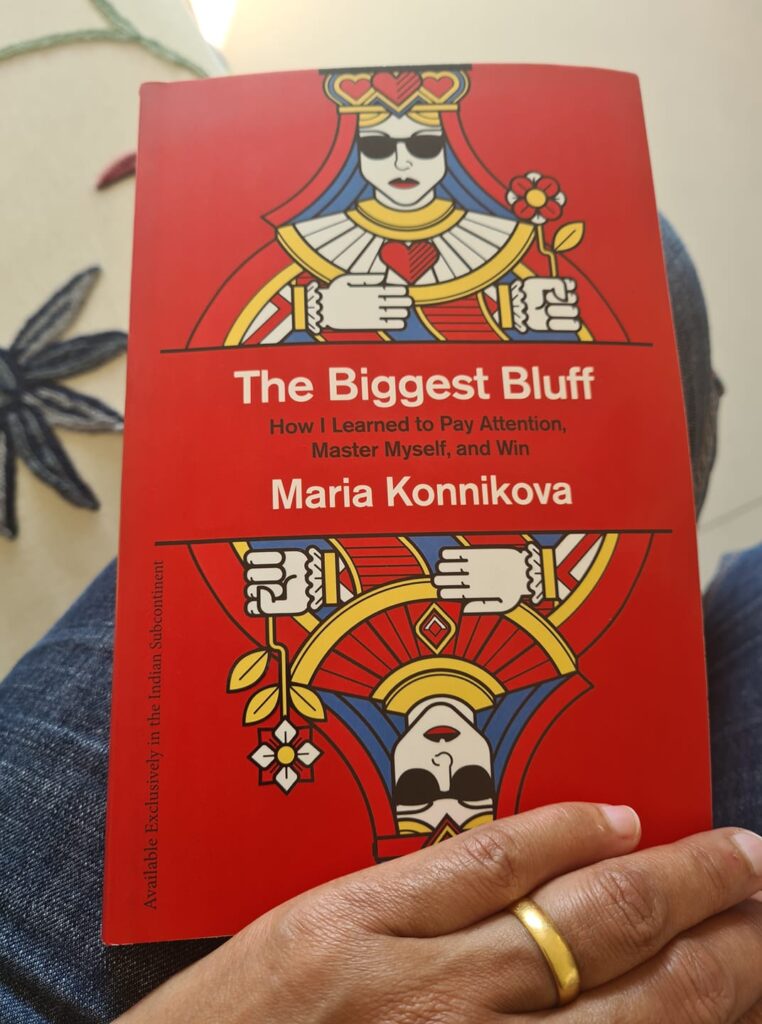“The Biggest Bluff” by Maria Konnikova

MariaKonnikova is a journalist who works for the NewYorker. She studied military theory and history combined with psychology in college. Ultimately she did a doctorate in psychology where her focus was on decision making. After a horrifically bad year (2015) when it seems as if her life was plagued by ill luck, she set herself a goal to learn poker. This amazing goal was set by a person who had no clue how many cards were in a deck. And she had a grandmother who was appalled at her granddaughter’s decision to learn a gambler’s game that she called “evil” instead of the more elegant game of chess. This was the same grandmother who had lived through World War II, survived Stalin, Khruschev and Gorbachev too. But Konnikova was determined and chose to seek out as her mentor, the Poker Hall of Fame inductee and winner of millions of dollars in earnings, Eric Seidel.
The Biggest Bluff ( HarperCollins India) is an enriching story about how Konnikova sets her goals, works hard, and along the way discovers a lot about herself as she masters poker. One of the facts that stands out about the game is that no player can afford to be delusional and have airs. You are what you are and this is how you will play the game. It is true to the personality of the player. As a result, Konnikova gets brilliant insights into human behaviour. She learns many invaluable lessons about negotiations, decision making, what it takes to be a woman and play as an equal while silencing out the #sexist remarks of the other players at the table, being attentive to the extent of blocking out all other distractions and focusing upon the players hands. This is a game dominated by male players. She learns the value of being confident about the skills one possesses rather than looking to others for assurances or even assuming others are better skilled than her. A crucial piece of information about herself that helps build her self-worth. It is also about developing patience and becoming a better strategist. It is not necessary that the best equipped or skilled or even the most aggressive player will win the jackpot, it boils down to strategy. It is preferable to be the dragonfly whose success rate at achieving a kill is 95% as compared to a cheetah ( 58%), lion (25%) and wolf (14%). So it is also about marshaling your facts together and reviewing the probability, being a critical thinker and constantly living in a state of inquiry. It is also about learning from failures and evaluating what comes next objectively. Never let emotions get in the way. She also learned to question the classic model for analysing behaviour: CAPS, or the cognitive-affective personality system. For decades it had been argued that the Big Five version of personality— openness to experience, conscientiousness, extraversion, neuroticism and agreeableness was fundamentally flawed. Konnikova discovers that people aren’t a combination of traits but a mosaic of reactions to and interactions with situations. She realises that poker is more about psychological and emotional dynamics than physical patterns. And the beauty of this understanding is that it is a dynamic situation that constantly changes depending upon the players involved and from moment to moment. The massive takeaway from this book is that Konnikova realises how many of the learnings she gleaned while preparing for various online and offline games/championships, have lifelong applications. It transformed her in many ways.
And yes, she did win a neat pile of US$300,000.
This book is begging to be made into a web series like the very popular Queens Gambit. It also deserves to be translated into many more languages. Some have referred to it as a feminist telling and others have called it a phenomenal story. It is an astonishing story that confirms that you are never too old to acquire a new skill and get the brain charged up.
There is no denying this is an interesting book but those who know the game will probably benefit more since at times, Konnikova takes deep dives into explaining a table setting and how hands are played. Nevertheless, read it. The strongest point she makes is that the players participate and win purely on the basis of merit and nothing else. She gives the example of talented people being interviewed or losing out on opportunities simply because their attitude/ inquisitive nature etc did not align with the feelings of the powers that be. In that sense, playing poker is a far freer activity as you are judged on the basis of merit. Sobering thought. Much to gain by reading this gem of a book.
7 February 2021
